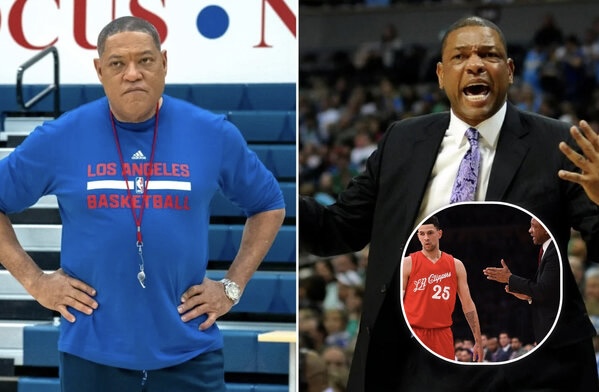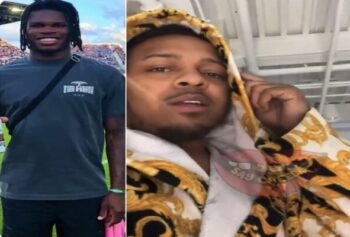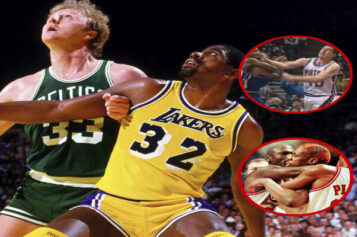You had to figure that the Hulu series “Clipped” would have a few critics here and there.
The loudest critic has been ESPN basketball analyst and former NBA player Austin Rivers — who is also the son of former Los Angeles Clippers coach and player Doc Rivers.
Then again, since he got into his seat of his “Off Guard” podcast Rivers has been speaking freely and creating controversy with his takes.
He’s another in a long line of NBA players whose celebrity makes people listen to the highly uninteresting and clout-chasing things they have to say on their podcast.
Shared on Instagram Monday, Rivers said the actor who played Warriors point guard Steph Curry is “like a third baseman for the Padres, adding, ‘Who the hell is that guy?’”

Rivers clearly didn’t like the casting for the movie, which is always a point of conversation when a movie drops featuring actors portraying well-known celebrities.
Austin Rivers Didn’t Like Cast Of Hulu “Clipped” Series
Viewers tend to be more critical, especially if the people being portrayed are alive now and in their primes.
The actors who played NBA stars Chris Paul and Klay Thompson didn’t float Rivers’ boat either.
“That’s just ridiculous. There’s no effort in this,” Rivers said.
To say there was no effort in the casting is a public criticism of the movie production and everyone involved.
Most people would be honored to have Laurence Fishburne portray them in a movie.
Doc Rivers was most likely very excited to hear that one of the best actors of this generation would portray him in “Clipped”
Austin Rivers wasn’t feeling it and explained why: “First off, Laurence Fishburne is a legend, and he’s a great actor. The body of my father is just a little bit different. I’m not saying he’s 100% in shape, but he’s built a little different than Laurence Fishburne. We could’ve done a little AI or something there.”
Lawrence Fishburne Didn’t Know Who Doc Rivers Was
While Austin Rivers felt free to comment on the quality of the cast, Fishburne claims in an interview with Dan Patrick that he didn’t even know who Doc Rivers was.
“As I told you, I’m not a sports fan,” Fishburne said.
Some fans agreed with Rivers’ take. Others used backhanded compliments to troll Rivers, whose claim to social media fame is that he only made the NBA because his dad was a legendary coach. Rivers has lived with that narrative his entire life despite being a serviceable NBA player thoughout his career.
Of course, some natural-born haters agree with Rivers.
Others made a light reference to Rivers’ high privilege and low hoops skill.
“This is the best thing austin rivers has ever done,” one said.
But some took the opportunity to openly disagree.
A second IG user wrote, “The show is good. Nobody expected clones of the people involved. Just whining for content and clinging to whatever your daddy does.”
The FX series, which debuted on Hulu on June 4, tells the well-documented story of former Clipper’s owner Donald Sterling’s downfall after released audio of him making racist remarks to his side piece.
The scandal made headlines in 2014 after Sterling’s assistant and side piece V. Stiviano leaked tape in which Sterling was going ballistic on her for taking a photo with Lakers legend Magic Johnson.
In the audio, Sterling said, “It bothers me a lot that you want to broadcast that you’re associating with Black people. Do you have to? You can sleep with [Black people]. You can bring them in, you can do whatever you want. The little I ask you is not to promote it on that … and not to bring them to my games.”
In the same tape, he later told Stiviano, “I’m just saying that it’s too bad you can’t admire him privately, and during your entire f–king life – your whole life — admire him, bring him here, feed him, f–k him, I don’t care. You can do anything. But don’t put him on Instagram for the world to have to see so they have to call me. And don’t bring him to my games. OK?”
His comments rocked the NBA because although it was no secret that Donald Sterling was a friend of systemic racism, the world, his players, the media, have never seen him in action or heard how he truly feels about the many Black players he employs.
When the audio hit the mainstream it blew up and eventually Clippers players and the rest of the NBA were on the brink of boycotting the playoffs if Sterling wasn’t removed as owner.
In an unprecedented move new NBA commissioner Adam Silver wasted no time forcing Sterling to sell the team and disassociating the billionaire with the NBA.
The Almost Boycott Of 2014
The Great NBA Boycott of 2014 will go down in sports mythology alongside UNLV’s boycott of the ’91 national championship game and the 1964 All-Star Game as one of the grandest near-boycotts of the past half-century. We’ll never know whether or not NBA commissioner Adam Silver banned Donald Sterling for life because of his own outrage or if the players pressured him into taking a step more severe than anyone else imagined he’d take. However, the Warriors reportedly were fully prepared to go through warmups, introductions and then walk off the floor after the tip-off in protest if Sterling weren’t punished to the fullest extent of the NBA’s bylaws.
“It would have been our only chance to make a statement in front of the biggest audience that we weren’t going to accept anything but the maximum punishment,” Curry said. “We would deal with the consequences later but we were not going to play.”
Things probably wouldn’t even have gotten that far if Silver had taken a different path. Clippers point guard Chris Paul is the NBPA president and after Sterling’s ban was announced, NBPA Vice President Roger Mason said that the remaining playoff teams were also prepared for a league-wide boycott that would have included the Clippers.
Sterling’s reign of racism started rearing its ugly head in 2006 when the Department of Justice sued Sterling for housing discrimination, alleging Sterling wouldn’t rent apartments he owned to Black or Hispanic people. He also wouldn’t rent to people with children.
Historically, Sterling being a white billionaire and looking down upon others was nothing new at the time, but what made the moment significant is that it represented a new age in the NBA. Where players empowered themselves to strike back against any forms of perceived racism or discrimination. They forced corporate’s hand and ushered in a new era of player activism throughout sports.



